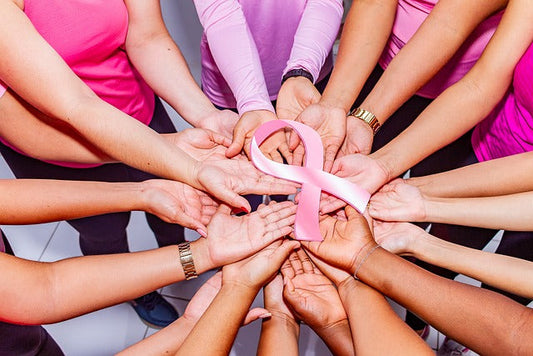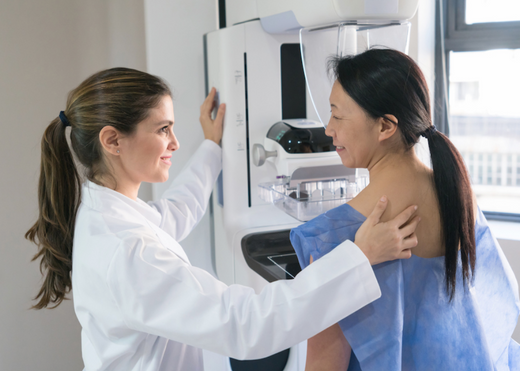Male Breast Cancer - know the facts and get checked
Find out moreMale breast cancer
Usually thought of as a disease seen only in women, male breast cancer is a rare but real risk, most often occurring in men over 60. The disease occurs in a small amount of breast tissue behind men’s nipples. There are about 350 men diagnosed each year in the UK compared to around 55,000 cases in women¹. As with many other cancers, if diagnosed early, men with male breast cancer have a good chance of being cured².
Causes of male breast cancer
The causes of male breast cancer are not clear. Doctors know that it occurs when some breast cells divide faster than healthy cells do. The new cells form a tumour that may spread (metastasise) to nearby tissue, to the lymph nodes or to other parts of the body.
Risk factors
Factors that increase the risk of male breast cancer include:
- Older age
- Exposure to oestrogen: For example, from oestrogen-related drugs, such as those used in hormone therapy for prostate cancer
- Family history of breast cancer
- Klinefelter's syndrome: A rare genetic syndrome causing boys to be born with more than one copy of the X chromosome
- Liver disease: Certain conditions, such as cirrhosis of the liver, can reduce male hormones and increase female hormones, increasing the risk of breast cancer
- Obesity: Obesity is associated with higher levels of oestrogen in the body, which increases the risk of male breast cancer
Symptoms
The symptoms of male breast cancer include³:
- A firm lump deep to the nipple
- Oozing (discharge) from the nipple that may be blood-stained
- A sore (ulcer) in the skin of the breast
- A nipple that is pulled into the breast (nipple retraction)
- Lumps under the arm
Male Breast Cancer Diagnosis
Diagnostic techniques used for detecting breast cancer in men are much the same as for women. Check4Cancer’s Breast Cancer Clinics include a clinical breast examination, ultrasound, mammogram and a biopsy if required. Available at clinics nationwide, the service is suitable for identifying male breast cancer.
Male Breast Cancer Treatment
Treatment typically involves surgery to remove the cancerous breast tissue. Most men diagnosed with breast cancer require mastectomy, often followed by radiotherapy to the chest wall area. Chemotherapy and hormone therapy may also be used following surgery based on the characteristics of the tumour. It should be noted that the exact type of treatment will depend on a number of tumour-related factors, including the size of the tumour, the presence of hormone receptors, and whether the tumour has spread to the lymph nodes. As with female breast cancer, if the cancer is caught in the early stages, a cure may be possible. This is why early detection is important as once the cancer becomes more advanced, the prognosis and survival will be worse, and a long-term cure may not be possible.
Worried about Male Breast Cancer?
If you are worried you may have symptoms of breast cancer or would like further advice, please contact us or arrange an appointment. We can book you in quickly, without the need for a GP referral, and get your results back to you as fast as possible.
References
¹https://www.cancerresearchuk.org/about-cancer/breast-cancer/types/male-breast-cancer
²https://www.nhs.uk/conditions/breast-cancer-in-men/">https://www.nhs.uk/conditions/breast-cancer-in-men/
³https://www.mayoclinic.org/diseases-conditions/male-breast-cancer/symptoms-causes/syc-20374740">https://www.mayoclinic.org/diseases-conditions/male-breast-cancer/symptoms-causes/syc-20374740

Professor Simon Russell
Deputy Chief Medical Officer and Advisor for Breast Cancer
Consultant Oncologist at Addenbrooke’s Hospital, Cambridge and Hinchingbrooke Hospital, Huntingdon, Cambridgeshire. Professor of Oncology, University of Rome Medical School. Professor Simon Russell is a Consultant Oncologist at Addenbrooke’s Hospital, Cambridge and Hinchingbrooke Hospital, Huntingdon. He leads the Urological Malignancy Service and has previously been lead clinician for the breast service. He is the lead for Radiotherapy for Genesis Cancer Care, Cambridge. He has served as the secretary of the British Uro-Oncology Group 2003-2015 and remains a Trustee. He was appointed Professor of Oncology at the University of Rome Medical School, Tor Vergata 2015. Simon joined Check4Cancer in 2018.
Find out moreKnowledge and support
Go to all articles
What is Breast Cancer Awareness Month? All You Need to Know
First introduced in 1985, Breast Cancer Awareness Month runs every October with the initial aim of encouraging breast cancer screening...
Read more
Do Mammograms Hurt?
How a mammogram works, how long it takes, if it’s normal to hurt, and what to expect after a mammogram.
Read more
What Happens At A Mammogram?
Looking at what a mammogram detects, how often you should have a breast screening, and what happens before, during and...
Read more